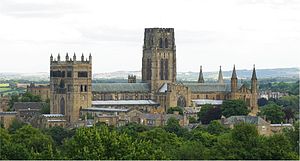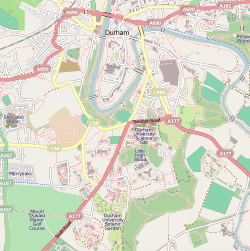Durham Cathedral
| Durham Cathedral | |
|---|---|
| The Cathedral Church of Christ, Blessed Mary the Virgin and St Cuthbert of Durham | |

Durham Cathedral from the south
|
|
| Coordinates: 54°46′25″N 1°34′34″W / 54.77361°N 1.57611°W | |
| Location | Durham |
| Country | England |
| Denomination | Church of England |
| Tradition | Broad Church |
| Website | durhamcathedral.co.uk |
| Architecture | |
| Style | Romanesque |
| Years built | 1093–1133 |
| Specifications | |
| Length | 469 feet (143 m) (interior) |
| Nave width | 81 feet (25 m) (inc aisles) |
| Nave height | 73 feet (22 m) |
| Choir height | 74 feet (23 m) |
| Number of towers | 3 |
| Tower height | 218 feet (66 m) (central tower) 144 feet (44 m) (western towers) |
| Administration | |
| Diocese | Durham (since 995 (continuation of the see of Lindisfarne)) |
| Province | York |
| Clergy | |
| Bishop(s) | Paul Butler |
| Dean | Andrew Tremlett |
| Precentor | David Kennedy (Sub Dean & Precentor) |
| Canon(s) | Rosalind Brown, Canon Librarian Sophie Jelley, Diocesan Canon Simon Oliver, Van Mildert Professor |
| Archdeacon | Ian Jagger |
| Laity | |
| Director of music | James Lancelot (Organist and Master of the Choristers) |
| Organist(s) | Francesca Massey (Sub Organist) |
| Chapter clerk | Philip Davies |
| Lay member(s) of chapter | Cathy Barnes Harvey Dowdy Ivor Stolliday (Treasurer) |
| Official name | Durham Castle and Cathedral |
| Type | Cultural |
| Criteria | ii, iv, vi |
| Designated | 1986 (10th session) |
| Reference no. | 370 |
| Extension | 2008 |
| State Party | United Kingdom |
| Region | Europe and North America |
The Cathedral Church of Christ, Blessed Mary the Virgin and St Cuthbert of Durham, usually known as Durham Cathedral and home of the Shrine of St Cuthbert, is a cathedral in the city of Durham, England, the seat of the Anglican Bishop of Durham. The bishopric dates from 995, with the present cathedral being founded in AD 1093. The cathedral is regarded as one of the finest examples of Norman architecture and has been designated a UNESCO World Heritage Site along with nearby Durham Castle, which faces it across Palace Green.
The present cathedral replaced the 10th century "White Church", built as part of a monastic foundation to house the shrine of Saint Cuthbert of Lindisfarne. The treasures of Durham Cathedral include relics of St Cuthbert, the head of St Oswald of Northumbria and the remains of the Venerable Bede. In addition, its Library contains one of the most complete sets of early printed books in England, the pre-Dissolution monastic accounts, and three copies of the Magna Carta.
Durham Cathedral occupies a strategic position on a promontory high above the River Wear. From 1080 until the 19th century the bishopric enjoyed the powers of a Bishop Palatine, having military as well as religious leadership and power. Durham Castle was built as the residence for the Bishop of Durham. The seat of the Bishop of Durham is the fourth most significant in the Church of England hierarchy, and he stands at the right hand of the monarch at coronations. Signposts for the modern day County Durham are subtitled "Land of the Prince Bishops."
...
Wikipedia

